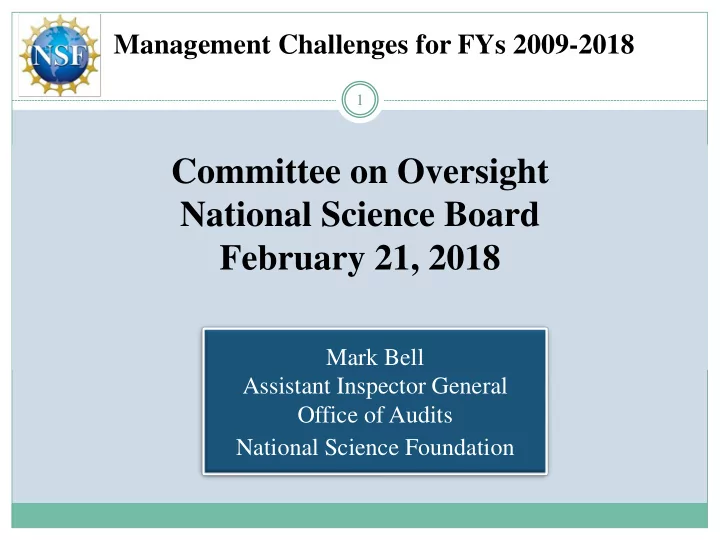

Management Challenges for FYs 2009-2018 1 Committee on Oversight National Science Board February 21, 2018 Mark Bell Assistant Inspector General Office of Audits National Science Foundation
Management Challenges 2 Annual OIG Reporting per Reports Consolidation Act of 2000. Some areas such as Grants Administration, Major Multi-Use Facilities (MMF), and Intergovernmental Personnel Act (IPA)/Human Capital will always pose challenges at NSF. Our focus is on strengthening controls within challenges areas to reduce risks. We are developing criteria to better evaluate challenges areas. Reporting - more clearly illustrate the breadth of each challenge, and NSF’s progress in addressing them.
Most Repeated Challenges (FYs 2009-2018) 3 Management of Large Facilities (Major Multi-Use Facilities/MMF) Accountability over Large Cooperative Agreements 9 Years Grant Administration Encouraging Ethical Conduct of Research Business Operations Human Capital/IPAs 8 Years USAP 7 Years Contract Administration 6 Years IT Issues 4 Years
Management of Large Facilities/MMFs; Accountability over Large Cooperative Agreements 4 Current Status Challenges over 10 Years End of 5-Year Significant Deficiency Adequate processes for: AICA (2017) requirements Chief Officer for Research Facilities for End-to-end cost surveillance of large lifecycle oversight for facilities (1/2/18) facilities/MMFs Procedures for holding and allocating contingency Accurate and reasonable construction cost proposals Remaining Challenges : Earned Value Management systems Implementing new policies and procedures Ensuring oversight of the full lifecycle of facilities from construction to operations Contingency funds and divestment (continuing challenge)
Grant Administration 5 Current Status Challenges over 10 Years Use of Award Monitoring and Business • Effective oversight throughout Assistance Program (AMBAP), which the lifecycle of awards includes baseline and advanced monitoring activities ACM$ • Audit resolution process iTRAK Revised proposal and award policies and • Clear guidance for awardees procedures to implement new Uniform Guidance (now 2 CFR 200) Stewardship Collaborative Remaining Challenges: FY 16 closure of two grants-related issues Balancing stewardship and oversight from prior Financial Statement Continuing to oversee large volume of Audits/Management Letters awards with limited resources
Human Capital/IPA 6 Current Status Challenges over 10 Years Performance Evaluations for IPAs • Annual performance evaluations for IPAs Mandatory training for new executives IPA costs • Updated policies and procedures to strengthen guidance on potential conflicts of interests, Controls over Independent Research/Development • such as IPAs’ submission of preliminary and Program (IRD), including tracking use of the continuing proposals while at NSF program IPA Steering Committee (April 2016) to IPA Conflicts of Interests • identify cost savings Pilot requiring cost sharing 10% of salary and Remaining Challenges: fringe benefits (estimated savings $ 2.8 M) IPA costs Elimination of lost consulting payments COI Track IRD travel costs and limit number of Turnover, especially of IPAs in trips leadership positions
Conclusions 7 Management Challenges highlight programs that may be high risk or have inherent risks. Granular focus within the challenges on underlying issues will ultimately reduce risk and move programs forward. Team effort with OIG and NSF to identify and mitigate risk. Management Challenges should used to inform risk management, audit planning, and focus for the future.
Questions? 8 Mark Bell 703-292-7100 mbell@nsf.gov
Recommend
More recommend